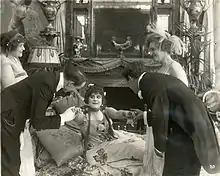Camille (1917 film)
Camille is a 1917 American silent film based on the play adaptation of La Dame aux Camélias (The Lady of the Camellias) by Alexandre Dumas, fils, first published in French as a novel in 1848 and as a play in 1852. Adapted for the screen by Adrian Johnson, Camille was directed by J. Gordon Edwards and starred Theda Bara as Camille and Albert Roscoe as her lover, Armand.[1]
| Camille | |
|---|---|
 Film still with Theda Bara | |
| Directed by | J. Gordon Edwards |
| Produced by | William Fox |
| Written by | Adrian Johnson (scenario) |
| Based on | La Dame aux Camélias by Alexandre Dumas, fils |
| Starring | Theda Bara Alan Roscoe Walter Law Glen White Alice Gale Claire Whitney Richard Barthelmess |
| Cinematography | Rial Schellinger |
| Distributed by | Fox Film Corporation |
Release date |
|
Running time | 60 minutes |
| Country | United States |
| Language | Silent English intertitles |

The film was produced by Fox Film Corporation and shot at the Fox Studio in Fort Lee, New Jersey.[2]
Plot
As described in a film magazine,[3] Armand Duval (Roscoe), a son in the proud but poor house of Duval, loves Camille (Bara), a notorious Parisian beauty. His love for Camille means that his sister Celeste (Whitney) cannot marry the man she loves, so the father goes to Camille and begs her to give Armand up, which she does. This arouses the anger of Armand and he denounces her one evening in public. The Count de Varville (Law) challenges Armand to a duel which he wins, wounding Armand in the arm. Believing Camille no longer loves him, Armand does not go to see her. One day his father tells him that Camille is dying. He goes to her and, after a few words, she dies in the arms of her lover.
Cast
- Theda Bara - Marguerite Gauthier ("Camille")
- Alan Roscoe - Armand Duval (as Albert Roscoe)
- Walter Law - Count de Varville
- Glen White - Gaston Rieux
- Alice Gale - Madame Prudence
- Claire Whitney - Celeste Duval
- Richard Barthelmess - Bit Part
Reception
Like many American films of the time, Camille was subject to cuts by city and state film censorship boards. The Chicago Board of Censors issued an Adults Only permit, cut two long gambling sequences where money was on the table and flashed all other gambling scenes, and cut the two intertitles "That woman once favored me when I was poor, now that I am rich bear witness that I pay" and "You are here because you are selfish - and make a sale of your love to the highest bidder".[4]
See also
References
- "Progressive Silent Film List: Camille (1917)". Silent Era. 26 January 2015. Retrieved 29 July 2016.
- Fort Lee: Birthplace of the Motion Picture Industry. Arcadia Publishing. 2006. p. 64. ISBN 0-738-54501-5.
- "Reviews: Camille". Exhibitors Herald. New York: Exhibitors Herald Company. 5 (18): 30. October 27, 1917.
- "Official Cut-Outs by the Chicago Board of Censors". Exhibitors Herald. 5 (16): 33. October 13, 1917.
External links
| Wikimedia Commons has media related to Camille (1917 film). |